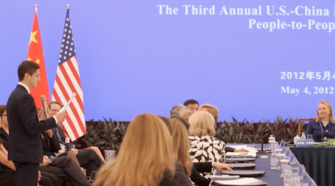You may be following the story of Chen Guangcheng, the blind Chinese dissident who fled to the U.S. Embassy right before high-level U.S.-China talks. He has subsequently been issued a passport and visa to work at New York University, where he landed just a few days ago. This, many argue, is a positive development in U.S.-China relations. Today, an American university-level student who lives in Beijing, shares his insight on U.S.-China relations, and a vision for the future. Daniel Tedesco is a 2011 Fulbright Scholar in Beijing and President of Global China Connection.
The phone rang in my Beijing apartment. It was the U.S. Embassy calling. They don’t normally call me.
The embassy official wanted me to give a speech about being an American student in China. The audience was to include Secretary of State Hillary Clinton, State Councilor Liu Yandong (the highest ranking female politician in China), Ambassador Gary Locke, and a crowd of 200 high-level business people and government officials. I had seven days to write it. In Chinese.

Photo courtesy U.S. Embassy in Beijing.
I was honored and scared to death. They didn’t tell me what to say, or even where to go. I’m a 23-year-old Fulbright Scholar in Chongqing, China, and I lead a student nonprofit called Global China Connection. I was to be one of only two student speakers—the other, a Chinese student who would give her address in English—at the U.S.-China High-level Consultation on People-to-People Exchange. This event is a sideline to the US-China Strategic and Economic Dialogue that had brought Secretary Clinton, Treasury Secretary Timothy Geithner and some 200 other American government officials to Beijing for this annual discussion with their Chinese counterparts. While this high-level dialogue, known as the S&ED, is aimed at solving global economic and security issues, the people-to-people forum is focused on encouraging Chinese and Americans to study together, work together, and live in each other’s countries.
So I reached out for help from my Chinese and American friends who are already doing that: Tyler Godoff, a Vanderbilt grad who works in Beijing for a Chinese state-owned enterprise; Flora Men, my girlfriend of three years, who got a masters degree in the United States and now works for an American company in Beijing; and a host of others. Preparing my speech turned into a people-to-people exchange.
We stayed up night after night, writing and rewriting, translating back and forth between Chinese and English, to get the meaning and tone just right. We wrote about the challenge of breaking out of our comfort zones to become real friends with people from a different culture. We talked about hope, how we as young Chinese and Americans can help our countries understand each other and avoid conflict. My friends politely listened as I nervously practiced the speech. Flora even recorded herself reciting it so I could listen while I slept.
Finally, last Friday morning, after seven days of writing and rehearsals, I arrived at the Chinese National Museum in Tiananmen Square.
My hands started shaking even before I found my seat. My Chinese is good, but not perfectly fluent. But this wasn’t about showing off language skills. I felt that I had something important to say. Before I knew it, I was standing on the stage going through my speech. I was shocked and delighted when I looked out at the audience and realized that the Chinese and Americans were not only listening but sharing broad smiles.
At the end of the speech, I looked directly at Secretary Clinton and State Councilor Liu and asked them a question. Imagine, I said, if you met in college and had been friends for decades. “How would that friendship impact U.S.-China relations?”
It had been a week of incredible tension and recrimination between the US and China. Negotiations involving activist Chen Guangcheng, the blind lawyer who had sought refuge in the U.S. Embassy, had been playing out on front pages worldwide and playing into the drama surrounding China’s leadership succession and the U.S. presidential election later this year. Meanwhile, at the S&ED, Secretary Clinton and her colleagues and Chinese counterparts had been discussing and debating the usual laundry list of tough and touchy topics: Currency exchange rates. Market access. Intellectual property protection. Cross border investments. Human rights. Religious freedom. Iran, North Korea, Syria, the Spratleys … need I say more?
How much easier would these discussions be, how many misunderstandings could be avoided, if Chinese and American political and business leaders were old friends, former classmates, people with a shared history who could sort out their differences because they knew each other as human beings. “Well,” I told them, “the next generation of Hillary Clintons and Liu Yandongs are students right now. Connecting them is one of the most important endeavors our countries can undertake today.”
I am trying to make this vision a reality through Global China Connection. I am the current president of this student-run organization. We have chapters at some 50 universities around the world. Our goal is to foster leadership skills and trusting personal relationships among Chinese and non-Chinese university students. Additionally, the Fulbright Program and President Obama’s 100,000 Strong initiative, a national effort to increase the number and diversity of American students studying in China, provide opportunities for young Americans and Chinese to deeply engage with each other in each other’s countries. Someday, the U.S.-China relationship will be in our hands. Through these and other activities, young people in China and America are already preparing for that day.
As Secretary Clinton said in her speech that followed mine: “The young people in both our nations have everything at stake as to how well we navigate through this time. And then in 20 years from now, I will fully expect to see some of these students... sitting in places like this, talking about the next phase of our relationship. That is as it should be.”